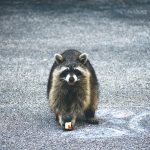Raccoons have a great sense of smell – so if your yard smells of something they don’t like – such as cinnamon, peppermint or garlic – they may well steer clear.
What Strong Scents Keep Raccoons Away?

Whenever you are thinking about using something as a deterrent – you have to think holistically. Yes, you need the actual deterrent – but you also need to remove the attractant and put the deterrent in the right place at the right time. The scent you choose may well be the best deterrent ever – but use it incorrectly – and that raccoon ain’t going nowhere.
Strong natural smells work well – so garlic, peppermint, cinnamon, and onions all carry a pungent smell that travels well. These types are used around edges of yards and fence-tops to stop nosey raccoons from even entering your property at all. If you were going to go into a store and it smelled of rotten fish – you wouldn’t even bother. Same with raccoons – if they have the choice to go elsewhere – they most likely will.
However, if you are in a location where raccoons will always pass over your land – say close to forests, tracks and wild zones – then perhaps more specific locations for your odors might be more appropriate. Scents that only cause a problem if inhaled can work in areas where raccoons try to break in – say grain or food stores.
Things like hot pepper, black pepper, and Epsom salts – will be inhaled and cause minor temporary discomfort. These will only work once the raccoon is almost on top of where you don’t want it to be though – so they can work well in larger or unfenced yards. Rather than having to drop the scent all over the place – you just focus it on the spots where it is going to be doing most of the sniffing. This is much better as it is really focused and doesn’t depend on the wind or excess spraying.
What Else Could Scare Raccoons?
Going bigger could involve different contraptions for sure. Things that when triggered by tiny raccoon feet make a loud noise, or caused something to move, could well have a deterrent effect on that one raccoon. If he went to jump over your fence and there was a bang – he’d probably go elsewhere – especially if this wasn’t the first time that had happened. But if there was a new raccoon in the area – they wouldn’t already know about it so would still hop on over.
And if at any point these other deterrents stopped working or weren’t ‘always’ triggered, they wouldn’t be a deterrent – they would be more of a gamble. Almost like a raccoon game. Will it – won’t it?
Can Bear Urine Scare Raccoons?

Something even bigger might be needed – even if that bigger thing is nowhere near your yard.
Animals have territories – and this can be really important to a raccoon. If it can smell an active (fresh) scent of a dog – it might think twice about going into the yard. But what if you could bottle the scent of a bear or wolf instead? A raccoon would certainly think twice about that gamble.
Unlike the smells of garlic and peppermint – we humans can’t smell territories – and so this may be less of a compromise for a yard or porch?
Will Human Urine Deter Raccoons from Coming Near My Home?
Human urine as raccoon repellent is a widely debated topic. Some claim that the odor acts as a strong deterrent for raccoons, while others are skeptical. While there is anecdotal evidence supporting its effectiveness, scientifically, the impact of human urine remains inconclusive. It’s crucial to consider other proven methods to keep raccoons away, such as securing trash cans and eliminating potential food sources.
Can Raccoons Climb Fences?
Unfortunately, raccoons are very good at scaling fences or finding a way through a fence. Unless it is a sheer smooth surface, very high without any tree cover – or has weak gates – a raccoon could get in. But as before – only if there is a reason to get in. Hungry raccoons can be very determined if they can smell food.
Using their very athletic bodies and strong claws and hands – they can grapple their way up and over almost any fence – with ease usually. They can also run along the tops too – like they have done it all their lives.
They also are at ease in the trees – so climbing up wooden panels and posts isn’t even something a raccoon would even think about. They simply climb it like any other obstacle in the woods.
Raccoons also have very clever ankles. They can rotate their feet backward when climbing down a tree (or fence) so they can grasp behind them and slow their descent. Unlike other mammals who would have to ‘run’ down headfirst – raccoons can actually control their speed – and even stop mid tree. Great skills for avoiding predators (or raiding your garden)!










